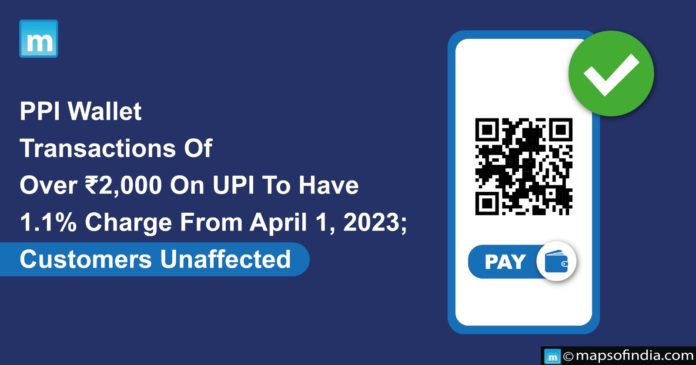Using Prepaid Payment Instruments (PPIs) for transactions through UPI will incur an interchange fee, according to the National Payments Corporation of India (NPCI). The fees will be applied if the transaction is for more than 2,000 rupees.
UPI Transaction Charges
The most popular and widely used payment method in India is UPI, which lets users instantly transfer money between bank accounts via smartphones. On the other hand, PPIs (prepaid payment instruments) are electronic wallets that let users store money and send payments. Paytm, PhonePe, and Google Pay are just a few of the PPIs available in India. One bank will charge another bank an interchange fee to process a transaction. The bank of the merchant, the person or business receiving the payment, pays the bank of the payer, who is the person making the payment, the interchange fee in the case of UPI transactions.
The New Rule
An interchange fee of up to 1.1% will be applied to merchant UPI (Unified Payments Interface) transactions starting on April 1, according to a notification from the National Payments Corporation of India (NPCI).
NPCI Press Release: UPI is free, fast, secure and seamless
Every month, over 8 billion transactions are processed free for customers and merchants using bank-accounts@EconomicTimes @FinancialXpress @businessline @bsindia @livemint @moneycontrolcom @timesofindia @dilipasbe pic.twitter.com/VpsdUt5u7U— NPCI (@NPCI_NPCI) March 29, 2023
The NPCI recently issued a circular stating that an interchange fee will be associated with using Prepaid Payment Instruments (PPIs) for transactions through UPI. If the transaction exceeds 2,000 rupees, fees will be assessed. Different types of merchants pay different interchange fees. A cap also applies in some categories and ranges from 0.5% to 1.1%. The introduced fee is only applicable for merchant transactions made using prepaid payment instruments, according to a notification released by NPCI.
The payments body clarified that no fees would be applied to typical UPI payments, also known as “bank account-to-bank account-based UPI payments,” defined as such. Transactions made using a wallet with a value of less than Rs 2000 won’t incur this fee. It will be the merchant’s responsibility to pay the fee. Accordingly, businesses have the option of passing the additional cost onto customers. Direct bank account-to-bank account UPI transactions, or regular UPI transactions, remain free.
The interchange fee is 0.7% for utilities/post offices, telecom, and education and 0.9% of the transaction value for supermarkets. For insurance, government, mutual funds, and railroads, there will be a 1% charge; for fuel, a 0.5% charge; and for agriculture, a 0.7 charge.
Other transactions
Peer-to-peer and peer-to-peer-merchant (P2PM) transactions will not be subject to exchange. The wallet-loading fee for PPP issuers’ transactions exceeding 2,000 will be 15 basis points (bps), payable to the remitter bank. It will be reviewed by September 2023
The NPCI asserts that the interchange fee under consideration is consistent with the interchange fee recommendation of up to 1.15% for UPI transactions made by the Committee on Payments and Market Infrastructures and the World Bank. The NPCI thinks that by offering PPI providers incentives to promote UPI transactions for higher amounts, the average transaction value of UPI transactions can be raised, and the total cost of India’s payment systems can be decreased.




